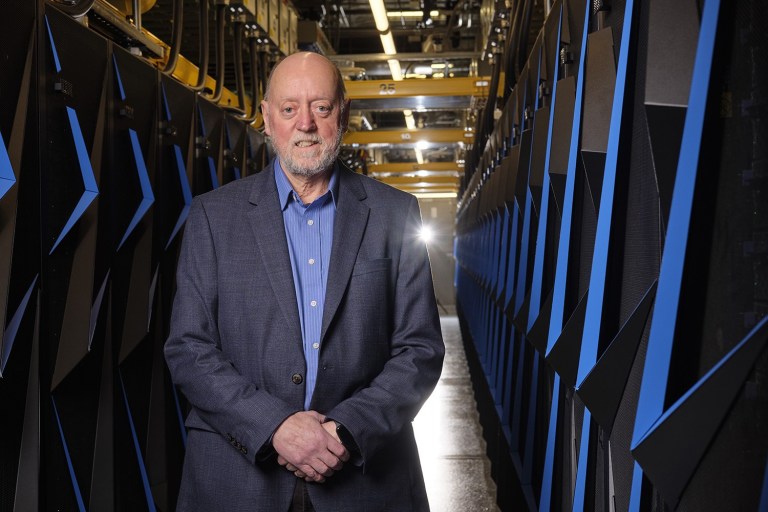 Jack Dongarra, professor emeritus in the University of Tennessee, Knoxville’s Tickle College of Engineering and a research and development staff member in Oak Ridge National Laboratory’s Computer Science and Mathematics Division, was one of 120 members and 23 international members elected to the National Academy of Sciences “in recognition of their distinguished and continuing achievements in original research.”
Jack Dongarra, professor emeritus in the University of Tennessee, Knoxville’s Tickle College of Engineering and a research and development staff member in Oak Ridge National Laboratory’s Computer Science and Mathematics Division, was one of 120 members and 23 international members elected to the National Academy of Sciences “in recognition of their distinguished and continuing achievements in original research.”
“I want to recognize all the help colleagues and collaborators have provided me over the years,” Dongarra said. “An award like this couldn’t have happened without the support and contributions of many people over time. I am honored and humbled by this recognition, and thankful for those who made it possible.”
Even after his retirement from faculty, Dongarra has continued to work as a research professor at the Innovative Computing Laboratory (ICL), which he founded in 1989 when he joined UT as a distinguished professor and ORNL as a distinguished scientist.
“Being elected to the Academy of Sciences is a well-deserved recognition of Jack Dongarra’s exceptional contributions in the field of high-performance computing and beyond,” said Provost and Senior Vice Chancellor John Zomchick. “It is one of the highest honors a researcher can achieve, and a testament to the impact his work has had on the scientific community.”
Through the ICL, Dongarra was instrumental in the rise of the supercomputing era through his work with libraries and other computer-related software and systems. The software developed over the last few decades has now become the industry standard.
Areas as diverse as health care, economics, renewable energy, and big data analytics have been fundamentally improved through his work advancing high-performance computing, touching many aspects of modern life, even outside of the world of computing.
“Throughout his career, Jack has made contributions that have forever altered the computing community and multiple institutions, including ORNL,” said Jeff Smith, ORNL interim director. “This is an incredible, well-deserved achievement, and we are proud to call Jack one of our own.”
Among other honors, as a sign of his importance to computing, the Association of Computing Machinery awarded Dongarra the 2021 A.M. Turing Award for his efforts, often referred to as the Nobel Prize of computing.
In 1992, Dongarra also helped establish and coordinate the TOP500 effort to rank the world’s most powerful supercomputer, which comes out twice a year and has garnered public attention even outside the world of supercomputing.
After earning his bachelor’s in mathematics from Chicago State University in 1972, he went on to earn his master’s in computer science from the Illinois Institute of Technology in 1973, and his doctorate in applied mathematics from the University of New Mexico in 1980. He began his career at Argonne National Laboratory while still an undergraduate and continued to work there until leaving for UT and ORNL.
Dongarra is also a member of the National Academy of Engineering, a Foreign Fellow of the Royal Society, a Fellow of the Association for Computing Machinery, a Fellow of the American Association for the Advancement of Science, and served as Turing Fellow with the University of Manchester in the United Kingdom.
The National Academy of Sciences is a private nonprofit institution that was established under a congressional charter signed by President Abraham Lincoln in 1863. It recognizes achievement in science by election to membership, and—with the National Academy of Engineering and the National Academy of Medicine—provides science, engineering, and health policy advice to the federal government and other organizations.
Those elected bring the total number of active members to 2,565 and the total number of international members to 526. International members are nonvoting members of the academy with citizenship outside the United States. Dongarra joins Gore Hunger Professor of Environmental Science Dan Simberloff in UT’s Department of Ecology and Evolutionary Biology, and Chancellor’s Professor Emeritus of Planetary Geoscience Harry “Hap” Y. McSween, who was elected in 2021, as UT’s NAS members.